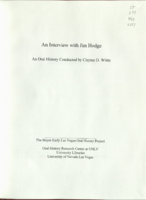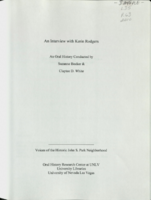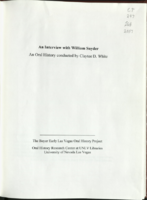Search the Special Collections and Archives Portal
Search Results

José Armando Elique interview, January 14, 2019: transcript
Date
Archival Collection
Description
José Armando Elique was born on February 14, 1944 in New York City. Born to Puerto Rican parents that immigrated to the United States in the 20s, Elique spent his childhood in both New York and Puerto Rico. Raised in the South Bronx, Elique’s family were part of the first pioneros from Puerto Ricans to settle in New York City in the twentieth century. Elique served as a radar man in the United States Navy during the Vietnam War on the USS Purdey. After his service, Elique applied to the Port Authority Police Department where his first big assignment included going undercover and investigating gang activity. Over the course of the next 22 years, he rose through the rankings becoming the assistant chief in charge of overseeing six facilities in the region. Elique is the first and only Latino to reach such rank with the Port Authority. Elique moved to Nevada in 2000 and became the chief of UNLV Police Services. Prior to coming to UNLV, he served as the University Director of Public Safety for the City University of New York (CUNY). Elique is also a member of the National Latino Police Officers Association, an organization that helps train Latino officers on contemporary issues and promote the advancement of Latinos in the police force. As police chief, Elique has fought for the hiring of new police officers to better serve UNLV’s campus and student body. As Chief of Police, Elique oversaw the response of his team to secure the campus and to provide for the needs of those seeking refuge at Thomas and Mack Center on the night of October 1, 2017. Chief Elique is also part of the Remembering 1 October oral history project where he reflected on that night, the role of campus police, coordination with Metro Police, purpose of the Fusion Center, command post, Emergency Operation Center for business continuity, and preparedness of urgent situation and active shooters. He is a graduate of Adelphi University and of Northwestern University’s Traffic Institute of Police Administration and the Police Executive Research Forum’s Senior Management Institute for Police.
Text

Transcript of interview with Paul Huffey and Michael Mack by Claytee White, February 2, 2010
Date
Archival Collection
Description
Whenever Paul Huffey drives through John S. Park Neighborhood he visualizes his youth and the times he spent with his childhood friend Michael Mack, who joined in this interview. Together they reminisced about their teen years in the 1950s and living in John S. Park Neighborhood. Paul's first home was Normandie Court, the first authentic motel in Las Vegas. In 1947, Paul's father purchased a lot on Paseo Park and built a home for his wife and only child. He describes life in that home as idyllic: no war or unemployment issues, a time when the Strip was "meaningless" unless you had a parent working there. An era when mothers, at least in his neighborhood, were stay-at-home moms and children freely roamed on their bicycles. Of their teen years, Paul and Michael recall their hi-jinks, discovering beer, and admiring pretty girls. In 1956, he graduated from Las Vegas High School, enlisted in the U. S. Army Reserve and enrolled in University of Nevada Reno. He taught history at Basic High School in Henderson for nine years.
Text

Transcript of interview with Jim Hodge by Claytee White, April 13, 2009
Date
Archival Collection
Description
Jim Hodge describes an active and success filled life in this narrative. Born and raised in the South, Jim enlisted in the Navy at the young age of 17, just as World War II was winding down. His primary job was that of a cook. He became smitten with the life of an entertainer after participating in a play and headed for Hollywood in 1952. It was there that he auditioned for Donn Arden, who organized and directed Las Vegas shows. Though he didn't get the part, he did get hired to be a singer for a show featuring Betty Grable. Thus his career was launched and would span the heyday of Las Vegas entertainment from the 1950s to the 1970s. Jim talks about the people, shows and places that touched his life. He also offers thoughts about the changes in the Vegas entertainment scene as well as shares his relationship with his church over the past 40 years.
Text

Transcript of interview with Harriet Trudell by Caryll Batt Dziedziak, May 3, 2006
Date
Archival Collection
Description
Born on August 22, 1935, Harriet spent her childhood years in the segregated southern cities of St. Petersburg, Florida and Mobile, Alabama. Daughter to a blue collar plumber, who was also a union organizer and ‘rabid Democrat,’ Harriet recalls her father saying, “Remember children, you know what meat tastes like because there’s a man named Franklin Roosevelt.” Unsurprisingly, she grew up thinking Roosevelt was God. With her mother’s sudden death at age thirty-one from a cerebral hemorrhage, ten year old Harriet spent two years at a boarding school before rejoining her younger brother at her maternal grandparents in St. Petersburg. Florida. During this time, her father also based out of the grandparents’ home while following big construction work opportunities at various cities. In 1948, sixteen-year-old Harriet accompanied her father, an Alabama Delegate, to the Democratic National Convention. Hearing Hubert Humphrey’s Civil Rights speech change her life. “I came home from that conve
Text

Transcript of interview with Florence McClure by Joanne Goodwin, January 24, 1996 & February 6, 1996
Date
Archival Collection
Description
Florence McClure came to Las Vegas later in her life, but the state felt her presence and the community her contributions as if she were a native daughter. Introduced to the League of Women Voters in 1967, McClure met her political mentor Jean Ford and learned how to practice the core elements of democracy. She put those tools to work in a number of ways, however her participation in the creation of the Rape Crises Center and her advocacy for locating the women’s prison near Las Vegas are two of her long-lasting efforts. Florence Alberta Schilling was born in southern Illinois where she enjoyed the security of a tight-knit family and the independence to test her abilities growing up. She graduated from high school and attended the MacMurray College for Women at Jacksonville. With the attack on Pearl Harbor in 1941, she began a series of jobs working for the war effort. She moved to Ypsilanti, Michigan with a girlfriend to work at the Willow Run Army Airbase and then moved to Miami, Florida where she worked for the Provost Marshall in the Security and Intelligence Division. She met her husband, James McClure, at the time and they married in 1945. During the next several years, they raised a family and moved around the country and to Japan with the military. McClure came to Las Vegas in 1966 as part of her work in the hotel industry which she engaged in after her husband’s retirement from the military. She had worked in California and Miami Beach, but it was Burton Cohen in Los Angeles who invited her to join him in a move to Las Vegas to build the new Frontier Hotel and Casino. Following the completion of the Frontier, she moved to the Desert Inn with Cohen in 1967 and worked as the executive office manager. After a few years, she decided to leave the industry and complete her college education. She graduated from UNLV in 1971with a BA in Sociology with an emphasis on criminology. She was 50 years old. McClure had been a member of the League of Women Voters for a few years at that point and had learned the political process from Jean Ford and workshops on lobbying. She had numerous skills that were waiting to be tapped when she attended an informational meeting on the incidence of rape in the Las Vegas valley. From that meeting, a small group of individuals, including McClure, began the organization Community Action Against Rape (later renamed the Rape Crisis Center) in 1973. It was the first agency in the area devoted to serving individuals who had been assaulted and changing the laws on rape. The organization’s first office was set up in McClure’s home. Over the next decade, she worked to change attitudes and reshape policy by constantly raising the issues of sexual assault with police officers, emergency room doctors, judges, and legislators. Her role as an advocate took her into hospital emergency rooms and courtrooms to assist victims. It also took her to the state legislator to lobby repeatedly for a change in laws. During this period, journalist Jan Seagrave gave McClure the nickname “Hurricane Florence” - a fitting moniker that captured the force with which McClure attacked the issue. As a result of her efforts and those of the people with whom she worked, we now 1) recognize rape as a crime of assault; 2) forbid the sexual history of a rape victim from being used against her in court; and 3) recognize marital rape. In addition to learning about Florence McClure’s activities, the reader of this interview will gain information on the role of civic organizations like the League of Women Voters in engaging the voluntary efforts of women in the post-war years.
Text

Transcript of interview with Stanley Goldstein by Carol A. Semendoff, October 25, 1979
Date
Archival Collection
Description
On October 25, 1979, collector Carol A. Semendoff interviewed bartender, Stanley Goldstein (born on December 5th, 1933) in his place of residence. This interview covers Mr. Goldstein’s personal historical profile as a Las Vegas, Nevada resident. Also during this interview, Mr. Goldstein discusses the Strip, gambling, prostitution, and the history of the major casinos.
Text

Transcript of interview with Toshiyuki "George" Goto by Christina Oda, February 26, 1979
Date
Archival Collection
Description
On February 26, 1979, Christina Oda interviewed Toshiyuki “George” Goto (born 1922 in Huntington Beach, California) about his life in Nevada. Goto first talks about his move to Nevada in 1951 before talking about his family, church activities, politics, and recreational activities. He then discusses the building, economic, and environmental changes in Las Vegas. Goto later talks in depth about his profession in landscaping, including the work he completed for some of the hotels and resorts built on the Las Vegas Strip. The latter part of the interview includes discussion about Goto’s Japanese ancestry and his perceptions as a minority when first moving to and living in Las Vegas. The interview’s conclusion covers the topics of social activities and Goto’s organization of a local chapter of the Japanese American Citizens League.
Text

Transcript of interview with Vincent "Vince" Hart by Andrew Bannister, February 21, 1980
Date
Archival Collection
Description
On February 21, 1980, Andrew Bannister interviewed Vincent “Vince” Hart (born on July 7, 1945 in Jerusalem, Palestine) in Hart’s office about his experience with youth soccer, both as a coach and as a player. Hart discusses his family background and his residential history in the United Kingdom and the United States before explaining the development of the men’s soccer team at the University of Nevada, Las Vegas. He describes his impact on the program and his hopes for future student athletes. The two then delve into a discussion of the fundamentals of soccer and different strategies that are commonly used. They then conclude with a brief description of Vince’s experiences with meeting a variety of professional soccer players at the Las Vegas Stadium.
Text

Transcript of interview with Kerin Scianna Rodgers by Suzanne Becker and Claytee D. White, February 7, 2009 and August 11 & 16, 2011
Date
Archival Collection
Description
Kerin Rodgers was born in 1936. She recounts her family history and stories of her youth growing up in Boston, MA, and shares how the family relocated to Seattle, WA in the mid-1940s. She talks about her enjoyment of theatrical arts and politics, and about being a resourceful divorced, single-mom and entrepreneur. In 1958 she opened a retail fashion store and modeling agency with a friend in Santa Monica, CA. Kerin had a knack for fashion and interior design that would assist her then and into the future. She also shares the story of arriving in Las Vegas as part of retail job with The Broadway stores in 1966—a two-week stint that seemed to have no ending. Her transition into Las Vegas included remarriage, a 1974 Keno win that enabled her to put down money on a home ( a house built by Paul Huffey) in the John S. Park neighborhood, and making close friends in the community. Her interview is sprinkled with tales of activities and personalities from the neighborhood's past and present. Kerin was involved with the Focus Youth House, speaks about First Fridays and art, as well as gives a perspective of police, criminal behaviors and changes in the neighborhood over the years. She hosted a local television show and enjoyed being a community activist.
Text

Transcript of interview with Bill Snyder by Claytee White, November 21, 2008
Date
Archival Collection
Description
In 1978 Bill Snyder came Las Vegas for a heavyweight championship fight between his homeboy, Larry Holmes and Ken Norton. During that visit, he saw cranes dotting the cityscape so he returned home and proposed that the family move across country and settle in the desert. His wife, Joy, gave him a year. And as they say, the rest is history. And what am amazing history it is. In this interview, Bill Snyder talks about his life from its beginning in Easton, Pennsylvania, where he discovered the challenge of architecture first by perusing books in the library and then by hands-on construction experience. But his love of art built the foundation to this treasured craft that has allowed him to design homes, office buildings, airport terminals and the McCaw School of Mines on the campus of McCaw Elementary School in Henderson, NV. The projects that Mr. Snyder seems to prize most are those that include the imagination of children. The people who shaped his life are introduced and the impact of his military training is wonderfully expressed. His connection with young people is paramount throughout the oral history that is beautifully documented with images of many of the projects that displayed children's art in an exciting way. Bill and Joy are the parents of two sons. Dana age 36, lives with his wife Christine in Hollywood, California, and works as a voice actor best known for his role as Master Shake on the cartoon Aqua Teen Hunger Force. Their younger son, Mike age 31, owns The Krate, a clothing, music, and art shop in Santa Cruz, California, where he lives with his wife Mandy and daughter Maya. A husband, father, sports car enthusiast, runner, thinker and lover of teaching and trusting young people, Bill Snyder is a brilliant architect and manager of people. He is dyslectic and never expected a school to be named in his honor but the William E. Snyder Elementary School was dedicated in 2001 with overwhelming community support. One of his current goals is to dream an architectural project that rivals the McCaw School of Mines for his own school. I trust that you will learn to love architecture in a different and very profound way as you read this interview just as I did during my conversation with Bill.
Text
